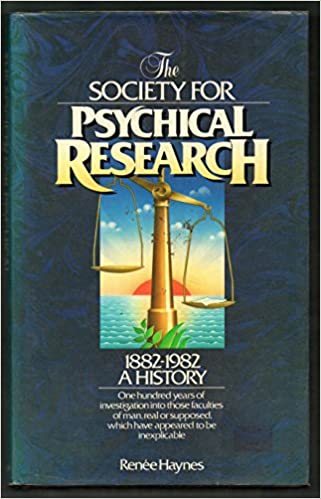
What a great question that I field often. I am a big fan of an article that appeared in PF’s Parapsychology Review in the July-August 1986 edition, Vol. 17 No. 4, written by Renee Haynes, which serves to consider cogently an answer. Renee Haynes (1906-1994) also known as Mrs. Renee Tickell, was a British novelist, psychical researcher and author. She authored several books concerned with parapsychology, serving as a Vice President of the Society for Psychical Research in London whose journal and proceedings she edited from 1970-1981. In the Garrett library you will find The Seeing Eye, the Seeing I; Perception, Sensory and Extrasensory (1976) Hidden Springs: An Enquiry into Extra-sensory Perception (1973) and The Society for Psychical Research: History 1882-1982 (1982). I had the pleasure of meeting her during PF’s 1973 PF International Conference Parapsychology and Anthropology, in London, the proceedings of which are still available here. Let me share a bit of her comments from that article that I personally find intriguing.

In answer to what do you mean by a ghost she opens stating “Any number of things, in fact; but before beginning to sort them out I should like to quote a useful definition, and an even more useful comment. The first was made by the Hungarian investigator Nandor Fodor in l933. ‘A ghost,’ he said, was a ‘deceased person, or its image, appearing to the living.’ (One might enlarge this a bit to read ‘appearing to, or heard by, the living.’) The second, ten years later, came from the philosopher Professor H.H. Price at Oxford, who pointed out that the often repeated query ‘Do you believe in ghosts?’ is ambiguous and ought to be replaced by ‘Do you believe that people experience apparitions?’

Both these remarks affect the question ‘What do you mean by a ghost?’…this must depend not only on what you think about such matters, but also, and to a much larger extent, on what you take for granted, without thinking, about them and the world in general; and also on the state of your ‘boggle threshold.’ … This varies very much from one individual to another and from one part of the world to another. The boggle threshold, equally variable, denotes the level of awareness at which the mind boggles when faced with an idea that cannot be fitted into an accepted pattern of thought, a neat jigsaw puzzle picture of the nature of things. The boggle threshold of people who have been trained to use their minds in logical, abstract and statistical ways is usually much lower than the boggle threshold of those who take life as it comes and accept the unexpected. It was good to find Sir Andrew Huxley, in his Presidential Address to the Royal Society, recommending the study of consciousness and observing that the careful findings of psychical research could be relevant. This matter of consciousness seems to me to be essential in the discussion of ghosts. Does what is perceived perceive in turn? Is it conscious itself and of you? This would seem to be so when it looks like having a purpose…I suspect, however, that no consciousness can be assumed in what may be called ‘regular’ hauntings independently observed by different people in different times in the same place. Here, as at a ‘cinema’, are shown again and again dramatic scenes or short flashes, from the past…But apparitions are not the province only of ‘the lunatic, the lover or the poet.’ Farmers, lawyers, all manner of healthy, stable, unimaginative persons have observed and reported them. They have also been checked and often proved to coincide with some event taking place at a distance, which could not have been known by normal means…The word ‘ghost’ has gone out of fashion…Now, the word has a dowdy, if bugaboo flavor, though it still has its uses… Back then to the original question: what do you mean by a ghost? Is it the surviving, bodiless, conscious spirit of a person who wants to communicate with the living; either to comfort them, or to tell them something important, like the whereabouts of a will, or of a receipt, or to ask that something should be done? Is it something projected by the percipient in response to some telepathic stimulus? Is it an image somehow imprinted on a certain landscape, an image or, better a sort of videotape recording (and repeating down the years) an episode of intense meaning to those who experienced it and to those who see it still, perceivers whose fear, horror or fascination may supply new fuel for the process involved, whatever it may be? The final possibility is of course that you mean by a ghost an illusion bred of fear or a hallucination hatched by the unconscious mind in a frenzy, or by a physiologically disordered brain. It looks as if the question could be answered in any one of these ways and as if ‘ghosts’ can only be assigned, if at all, to their appropriate categories by careful, detailed studies of time, place, associations, seers and seen. People will probably settle for whatever explanations are most congenial to them anyhow!”
So guys what do YOU think? Mrs. Haynes provided lots of food for thought and it is reassuring to know that the science of parapsychology continues those careful, detailed studies. Me, I sleep with a night light “just in case” but with Eileen Garrett in the family, can you blame me?